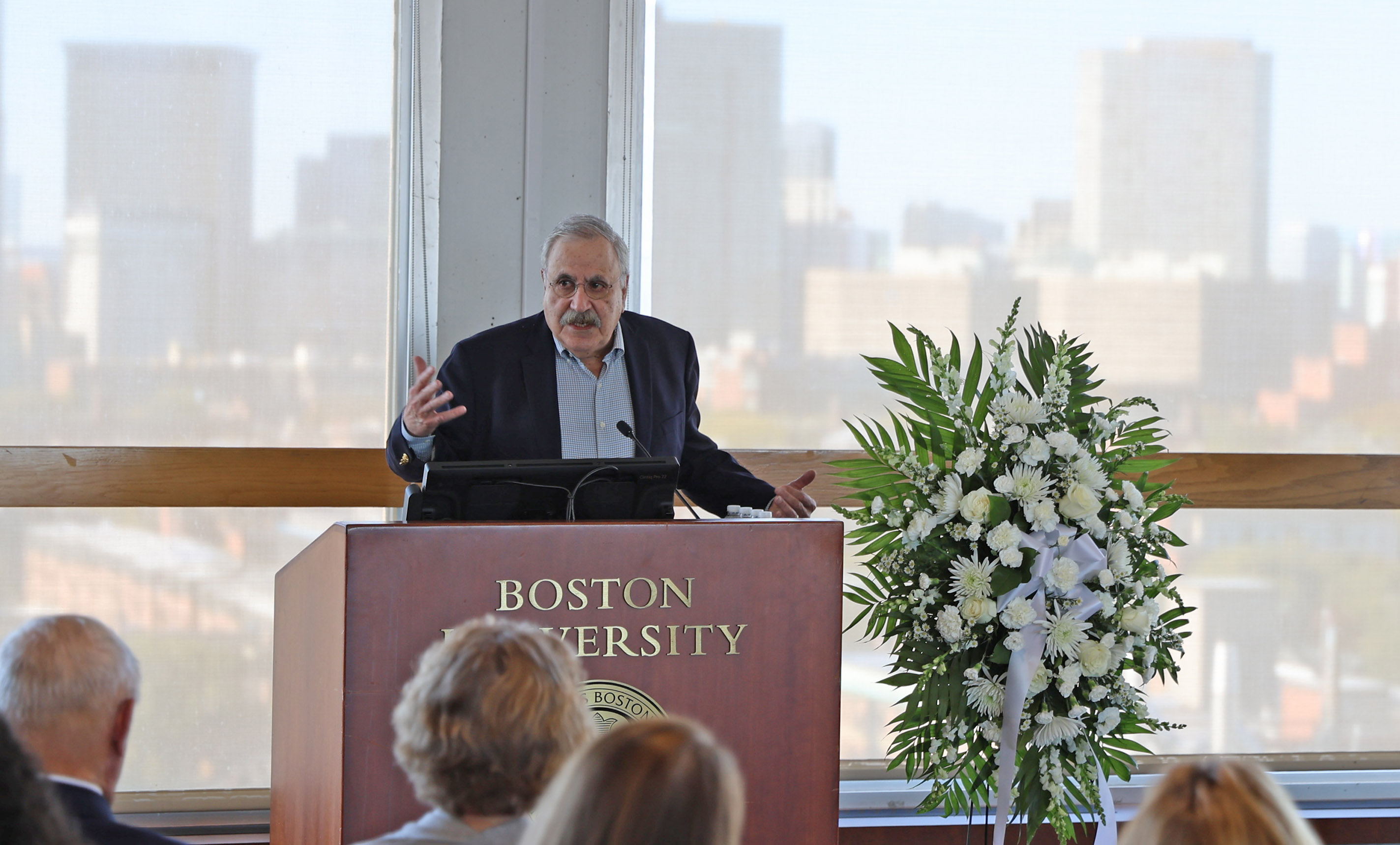SPH Celebrates the Life and Work of George Annas.

Professor Emeritus Leonard Glantz reflects on meeting Annas in 1973 while new faculty in the BU School of Law
SPH Celebrates the Life and Work of George Annas
Annas, a visionary health law pioneer, was remembered by all as a supportive mentor and ethical beacon for a generation of students and colleagues.
Friends, family, and former students of Professor George Annas gathered on October 17 for a celebration of life in honor of the scholar often referred to as the “father of patient rights.”
Annas died on May 30 at age 79, after an influential career that spanned more than five decades. He held the William Fairfield Warren Distinguished Professorship and served as faculty across three major schools at Boston University (Law, Medicine, and Public Health). He authored or edited more than 20 books and nearly 400 articles on health law, bioethics and human rights.
BU Provost Gloria Waters recognized the long legacy of health law scholars Annas mentored over the years, saying, “He brought his convictions to the classroom, and I think he had an incredible mark on aspiring health practitioners to the complex world of health outside the hospital.”
Waters joined other speakers in noting that Annas did not merely write about rights. He insisted that patients—especially those most vulnerable—be empowered, respected, able to refuse treatment, to have their autonomy recognized. His book The Rights of Hospital Patients: The Basic ACLU Guide to a Hospital Patient’s Rights, first published in 1975, became a foundational text in the field.
Professor Emeritus Leonard Glantz met Annas in 1973 while both were young faculty in the School of Law and they worked closely for much of the ensuing 52 years. Glantz said when Annas wrote his first book, it was specifically about the rights of hospital patients because “there was the sense that people in the hospital were at particular risk.”
Annas changed the title of the second edition to the more-encompassing The Rights of Patients, Glantz said, “because he understood the nature of the physician-patient relationship, and that the empowerment problems were not because of institutionalization but because of paternalism, and the lack of willingness to share responsibility in making healthcare decisions.”
The tone of the event was one of gratitude and remembrance rather than sorrow. Rather than being bound by formality, the celebration followed the spirit Annas embraced in life: openness, curiosity, commitment to human dignity, and a touch of lightness.

Professor Emerita Wendy Mariner said Annas’s reputation preceded him when she left the Harvard School of Public Health to accept dual appointments at BU in the School of Medicine and School of Public Health. “I’d heard George could be gruff, and he didn’t suffer fools lightly. But it turns out he was funny. He really wasn’t critical of people, only bad ideas. And if he argued with you, it was a sign of respect. He believed you could engage with his ideas intelligently and defend your own. And if you didn’t…he believed you could rethink your position.”
Michael Stein, chair of the Department of Health Law, Policy and Management, generated a few heartfelt laughs by recounting several of Annas’s stand-up comedy bits. “His routines were joyful, whether you thought they were funny or not,” Stein said. “He liked to make people laugh, he liked to make himself laugh. He was an absurdist, which meant telling things about the world that were ridiculous but true.”
Former SPH Dean Sandro Galea said he checked his calendar for his time as dean and saw that he and Annas met in his office 120 times. “In those meetings, we did a little business, but to be honest, not very much. In each of those hour-long meetings, we talked about living in a principled way, committed to a fair, ethical vision of how to be part of the business of generating a healthier world for all.”
Speakers and attendees included his children, Catherine and David; former students; colleagues; and patient advocates whose careers he helped shape. They shared stories of his lectures, many delivered informally, often in jeans and a sweater, peppered with jokes yet grounded in deep moral seriousness.
Former Dean Robert Meenan said spending 22 years working with Annas was “a remarkable experience.” Meenan said that despite his worldwide reputation and scholarly output, Annas was “a remarkable citizen of the school. And you don’t often see somebody with that sort of reputation being a hands-on teacher, being so devoted to the institution that he’s spent time in, because they could always pack up and leave.”
Annas left a richer understanding of what it means to speak of “patient rights”: not just as abstract words, but as protections that apply every day in hospitals, clinics, homes, prisons, and disaster zones.
A moment of tribute from Dean Adnan Hyder highlighted how, in his final days at Massachusetts General Hospital, Annas’s wishes were honored: no tubes, no defibrillators, no extraordinary measures—his end-of-life care respected in a way he had spent his career advocating for others.